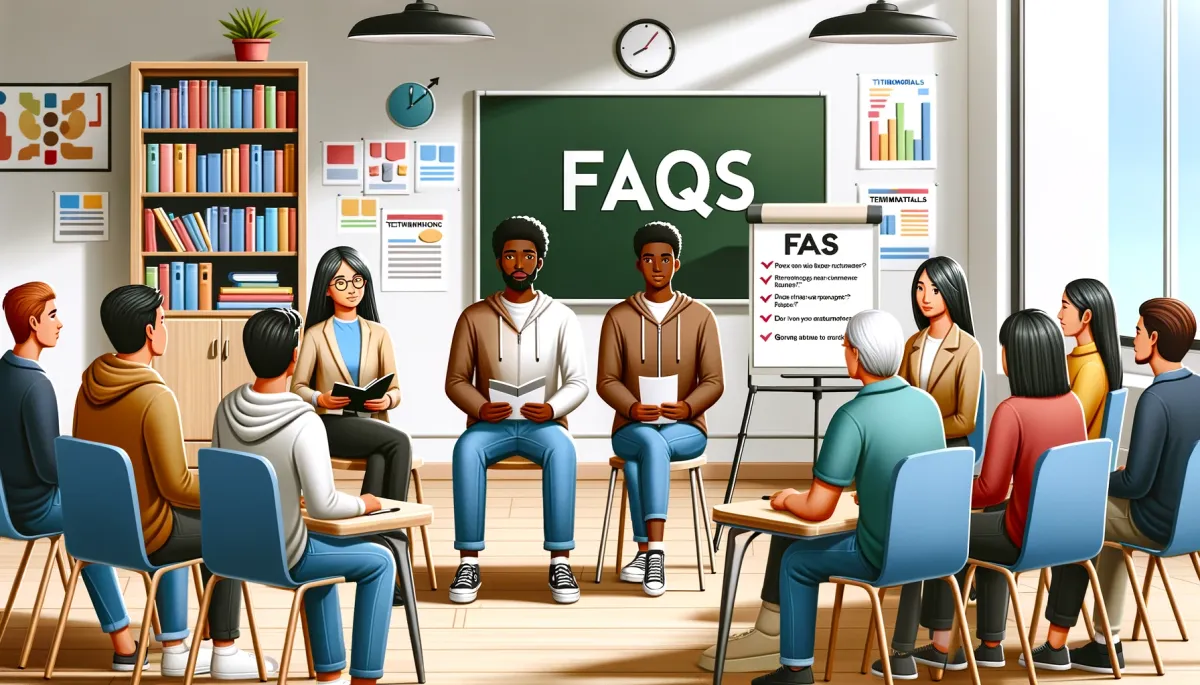How to Ask for Reviews and Testimonials from Students

Fanie Naude
CEO & Founder of Knowledgeable Tutor, Buznet Direct, YMC & Naude Consulting

Fanie Naude
CEO & Founder of Knowledgeable Tutor, Buznet Direct, YMC & Naude Consulting

I. Introduction
Ah, the digital age—a realm where your reputation can be built or shattered with a few clicks. In the world of online tutoring, reviews and testimonials serve as the digital currency that can either elevate your business or leave it languishing in obscurity. As the renowned entrepreneur Jeff Bezos once said, "Your brand is what other people say about you when you're not in the room."

II. The Importance of Reviews and Testimonials in Online Tutoring
Credibility and Trust
In an era where consumers are inundated with choices, credibility is your ticket to standing out. Reviews and testimonials provide social proof, a psychological phenomenon where people conform to the actions of others, assuming those actions are reflective of the correct behavior. According to a study by BrightLocal, 91% of consumers trust online reviews as much as personal recommendations. This trust is especially crucial in the education sector, where the stakes are high, and parents are discerning about who educates their children.
Word-of-Mouth Marketing
The power of word-of-mouth marketing is unparalleled. A glowing review or a heartfelt testimonial can travel far and wide, thanks to social media and online platforms. According to Nielsen, 92% of consumers believe suggestions from friends and family more than advertising. Reviews and testimonials serve as the modern-day word-of-mouth, providing authentic, user-generated content that can significantly influence potential students.
SEO Benefits
Search Engine Optimization (SEO) is not just about keywords and backlinks; it's also about content that engages and provides value. Reviews and testimonials can enhance your website's SEO by generating fresh, user-generated content. According to Moz, reviews are thought to make up 10% of how Google and other search engines decide to rank search results.
The Data-Backed Importance
- 91% of consumers trust online reviews as much as personal recommendations (BrightLocal)
- 92% of consumers believe suggestions from friends and family more than advertising (Nielsen)
- Reviews make up 10% of how search engines rank results (Moz)
This section serves as a primer on why you, as an online tutor, should not only care about reviews and testimonials but also actively seek them. They are not just vanity metrics; they are powerful tools that can significantly impact your online tutoring business.

III. Preparing to Ask for Reviews
Timing is Crucial
Ah, timing—the invisible hand that can make or break your request for a review. According to a study published in the Harvard Business Review, the majority of online customers take at least two days after receiving a product or service to post a review. In the context of online tutoring, this could translate to waiting for a couple of days after a successful tutoring session to ask for a review. The Wall Street Journal also conducted a study that suggests asking for reviews at four distinct time intervals: the day after, the fifth day, etc.
The Data-Backed Timing
- Majority wait at least two days to post a review (Harvard Business Review)
- Four distinct time intervals for review requests (Wall Street Journal)
Identifying Satisfied Students
Before you go on a review-asking spree, it's essential to identify which students are most likely to give you a positive review. These are often the students who have shown noticeable improvement, actively participate in sessions, or have verbally expressed their satisfaction.
Understanding Different Online Tutoring Platforms
Different platforms have different mechanisms for reviews. Some may allow anonymous reviews, while others may require a verified purchase of your tutoring service. Understanding the nuances of these platforms can help you tailor your review-asking strategy.

IV. How to Frame Your Request
Personalization
In a world drowning in automated messages, a personalized request can be a breath of fresh air. Use the student's name, refer to specific instances in your tutoring sessions, and make the student feel seen and valued. As James Humes aptly put it, "The art of communication is the language of leadership."
Directness vs. Subtlety
There's a fine line between being direct and coming off as pushy. On the other hand, being too subtle can result in your request going unnoticed. The key is to strike a balance. For instance, you could directly ask for a review at the end of a successful session or subtly incorporate it into your follow-up email.
The Art of Asking
- Direct Approach: "I'm glad you found our last session helpful! Would you mind leaving a review?"
- Subtle Approach: "Your feedback helps me improve. Feel free to share your thoughts on our tutoring platform."
By meticulously preparing and framing your request, you not only increase the likelihood of receiving a review but also ensure that the review is a genuine reflection of your tutoring service.

V. Asking in Person
Verbal Cues
When asking for a review in person, your tone, pitch, and body language play a significant role. A warm, genuine smile and open body language can make the student more receptive to your request. The key is to be authentic and not to sound like you're reading from a script.
The Art of Verbal Cues
- Tone: Maintain a friendly, approachable tone.
- Pitch: Keep your pitch moderate; too high may sound anxious, too low might seem disinterested.
- Body Language: Open palms, eye contact, and a relaxed posture can make a world of difference.
Ethical Considerations
Asking for reviews in person brings its own set of ethical considerations. For instance, it's crucial to maintain the student's confidentiality and not to pressure them into leaving a review. According to Counseling Today, there is potential for harm in asking for testimonials to be placed online, especially if the student feels coerced or uncomfortable.
Ethical Practices in Online Tutoring
Being ethical in your approach not only safeguards your reputation but also ensures that the reviews you receive are genuine and not influenced by any form of coercion.

VI. Asking via Email
Email Templates
Crafting the perfect email to ask for a review requires a blend of professionalism and personal touch. The email should be concise yet engaging, formal but not robotic. Here's a sample template:
Subject: We Love To Hear Your Thoughts On Our Recent Tutoring Session
Dear [Student Name],
I hope you found our recent session [Subject] beneficial. Your feedback is invaluable to us, we love hear your thoughts.
Would you mind taking a few minutes to leave a review?
Best regards,
[Your Name]
Follow-up Strategies
A single email may get lost in the student's inbox, so a gentle follow-up can serve as a reminder. However, avoid being too pushy; one or two follow-ups are generally considered acceptable.
Communicating Effectively with Parents of Students
If the student is a minor, it's often beneficial to include the parents in the email loop, especially if they were the ones who initially found and hired you for tutoring services.
By mastering the art of asking for reviews both in person and via email, you can significantly increase the number of genuine, positive reviews that you receive, thereby boosting your online reputation and business.

VII. Asking via Text or Messaging Apps
Convenience and Immediacy
Text messages or instant messaging apps like WhatsApp offer the advantage of immediacy. They can be read and responded to almost instantly, making them an effective medium for asking for reviews. However, the key is to keep the message short and to the point while maintaining a professional tone.
Sample Text Templates
Here are some sample text templates that you can use:
- Casual Approach: "Hey [Student's Name], enjoyed our last session on [Subject]. Mind leaving a quick review? 😊"
- Formal Approach: "Dear [Student's Name], your feedback would be invaluable to us. Kindly consider leaving a review."

VIII. Using Online Platforms
Google My Business, Yelp, etc.
Online platforms like Google My Business and Yelp are excellent avenues for gathering reviews. These platforms have high SEO value and can significantly impact your online visibility. However, each platform has its own set of guidelines for soliciting reviews, so make sure you're in compliance.
Marketing Yourself as an Online Tutor
Leveraging these platforms effectively requires a strategic approach. It's not just about asking for reviews but also about managing them. Respond to reviews, both positive and negative, to show that you value customer feedback. This is an integral part of marketing yourself as an online tutor.
Both text messaging and online platforms offer unique advantages and challenges. Texts are immediate and personal but can be seen as less formal. Online platforms offer the benefit of visibility and SEO but come with their own set of rules and guidelines. The key is to find the right balance and use each medium effectively to gather genuine, impactful reviews.
By understanding the nuances of each medium, you can tailor your approach to suit the specific needs and preferences of your students, thereby increasing the likelihood of receiving valuable reviews that can boost your online tutoring business.

IX. Incentivizing Reviews
Ethical Boundaries
Incentivizing reviews can be a slippery slope. While it's tempting to offer rewards for reviews, it's crucial to maintain ethical boundaries. According to Entrepreneur, it isn't ethical to solicit good reviews, but you can encourage customers to leave their feedback, whether positive or negative.
Rewards and Recognition
Offering a small token of appreciation, like a discount on the next session or a free study guide, can be an ethical way to incentivize reviews. However, it's essential to make it clear that the reward is for leaving a review, not for leaving a positive review.

X. Handling Negative Reviews
Professional Responses
Negative reviews are inevitable, but how you handle them can make all the difference. Always respond professionally and thank the reviewer for their feedback. Use this as an opportunity to improve your services.
Learning and Improvement
Take negative reviews as constructive criticism. Analyze what went wrong and how you can prevent similar issues in the future. This is a crucial part of Handling Difficult Tutoring Sessions.
Incentivizing reviews requires a delicate balance to maintain ethical integrity. Offering small rewards as tokens of appreciation can be an effective strategy, but it's crucial to ensure that these incentives do not compromise the authenticity of the reviews.
Negative reviews, while challenging, offer a unique opportunity for growth and improvement. By handling them professionally and constructively, you not only salvage a potentially damaged reputation but also gain valuable insights into areas for improvement.

XI. Utilizing Testimonials in Marketing
Website Placement
Once you've gathered testimonials, the next step is to strategically place them on your website. According to Neil Patel, testimonials should be prominently displayed on your homepage, service pages, and even the checkout page to build trust and credibility.
Social Media Strategies
Leveraging testimonials on social media platforms can significantly amplify their impact. Platforms like Facebook and Instagram allow for visually engaging posts that can feature your testimonials. For more on this, check out our guide on Using Social Media for Your Online Tutoring Business.

XII. Legal and Ethical Considerations
Consent and Privacy
Before publishing any testimonials, it's imperative to obtain written consent from the student or their guardian. This not only respects their privacy but also adheres to legal standards. According to TermsFeed, failing to do so could lead to legal complications.
Authenticity
Maintaining the authenticity of your testimonials is non-negotiable. Fabricating or altering testimonials is not only unethical but could also lead to legal repercussions. For more on ethical considerations, refer to our guide on Ethical Practices in Online Tutoring.
Utilizing testimonials in your marketing strategy requires a nuanced approach. They should be strategically placed on your website and leveraged on social media to maximize their impact. However, it's crucial to obtain proper consent and maintain the authenticity of these testimonials to adhere to both legal and ethical standards.
The legal and ethical considerations surrounding testimonials are not to be taken lightly. Obtaining proper consent ensures you respect the privacy of your students, while maintaining authenticity safeguards your reputation and avoids potential legal pitfalls.

XIII. Case Studies: Real-World Examples of Effective Testimonial Gathering
The theoretical framework is enlightening, but let's delve into the empirical realm. Case studies offer a magnifying glass into the practical application of theories. They are the crucible where abstract principles meet the concrete floor of reality.
The Krupnick Approach
The Krupnick Approach is an educational platform that has successfully gathered testimonials and case studies to build its brand. They have a dedicated section on their website where they showcase these testimonials. This not only builds credibility but also serves as a powerful marketing tool. Read more about The Krupnick Approach's strategy.
Keystone Tutors
Keystone Tutors, another educational platform, has a section on their website dedicated to testimonials. They have successfully gathered reviews from both parents and students, which adds a layer of authenticity and trust to their services. Explore Keystone Tutors' testimonials.
Online Tutor 2.0: Methodologies and Case Studies for Successful Learning
This is a research publication that demonstrates successful cases in online education and tutoring. It provides methodologies and case studies that can be beneficial for tutors looking to gather testimonials effectively. Check out the research publication.
Key Takeaways:
- Authenticity is crucial; real-world testimonials add a layer of trust.
- A dedicated section for testimonials on your website can serve as a powerful marketing tool.
- Research publications can provide valuable insights into effective testimonial gathering.
For more tips and strategies on building your online tutoring business, visit Building Your Online Tutoring Business: Tips and Strategies.

XIV. Frequently Asked Questions (FAQ)
Ah, the FAQ section, the sanctuary of the inquisitive mind. While I couldn't find specific FAQs on how to ask for reviews and testimonials from students, I can anticipate some questions based on common concerns in the industry.
How often should I ask for reviews?
You should aim to ask for reviews after significant milestones in the tutoring process. This could be after a successful exam, completion of a course, or any other achievement that leaves the student satisfied.
Is it ethical to edit testimonials?
Editing testimonials for grammatical errors is generally acceptable. However, altering the message or meaning is considered unethical and can damage your credibility.
What should I do if I receive a negative review?
Firstly, respond professionally and thank the reviewer for their feedback. Then, take steps to address the issue and improve your services. Negative reviews can be a valuable learning experience.
How can I encourage students to leave reviews?
You can incentivize reviews through small rewards or recognition. However, ensure that these incentives do not compromise the authenticity of the reviews.
How do I handle privacy concerns when publishing testimonials?
Always obtain explicit consent from the student or parent before publishing any testimonials. Make sure to adhere to privacy laws and regulations.
For more frequently asked questions about online tutoring, you can visit Online Tutoring Frequently Asked Questions.
"In God we trust; all others bring data." - W. Edwards Deming. This quote encapsulates the essence of this section. FAQs, backed by data and real-world examples, offer a robust framework for understanding the intricacies of gathering testimonials in the online tutoring landscape.

XV. Data-Backed Insights
"In God we trust; all others bring data." - W. Edwards Deming. This aphorism is particularly apt when discussing the impact of reviews and testimonials on your tutoring business. Let's delve into some statistics that underscore their importance.
Impact on Business Revenue
According to a study by the Spiegel Research Center, displaying reviews can increase conversion rates by 270%. This is a staggering figure that cannot be ignored by any online tutor aiming to expand their business. Read the full study here.
Credibility and Trust
A report by BrightLocal states that 91% of young consumers trust online reviews as much as personal recommendations. This is a clear indicator that reviews and testimonials can significantly boost your credibility. Explore the BrightLocal report.
SEO Benefits
Reviews contribute to about 15.44% of the ranking factors for local pack listings, according to a study by Moz. This implies that more reviews can improve your visibility on search engines. Check out the Moz study.
Key Takeaways:
- Reviews significantly impact conversion rates.
- They are trusted as much as personal recommendations by the younger generation.
- Reviews can improve your SEO rankings.
For more insights on the impact of reviews on business, you can visit Future of Online Tutoring: Trends to Watch.

Conclusion
The journey of gathering reviews and testimonials is akin to the process of academic inquiry: it starts with a question and ends with a deeper understanding of the world—in this case, your business world. Reviews and testimonials are not just digital applause; they are the lifeblood of your online tutoring business. They build trust, enhance credibility, and most importantly, they tell a story—a story where you are not just a tutor but a catalyst for change in someone's life.
The article has been a comprehensive guide, a one-stop-shop if you will, for tutors to understand the nuances of asking for reviews and testimonials from students. It has covered everything from the why to the how, from ethical considerations to data-backed insights.
So, as you venture into the digital corridors of online tutoring, remember the words of Jeff Bezos, "Your brand is what other people say about you when you're not in the room." Make sure they have something good to say.

